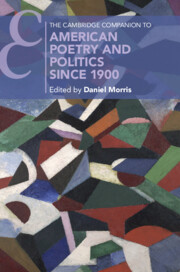Book contents
- The Cambridge Companion to American Poetry and Politics since 1900
- The Cambridge Companion to American Poetry and Politics since 1900
- Copyright page
- Contents
- Notes on Contributors
- Acknowledgments
- Introduction
- Chapter 1 The Space of Public Memory
- Chapter 2 Poetry and Propaganda
- Chapter 3 Depression-Era Poetics and the Politics of How to Read
- Chapter 4 The Politics and Poetics of Revolution
- Chapter 5 Wallace Stevens, Stanley Burnshaw, and the Defense of Poetry in an Age of Economic Determinism
- Chapter 6 The Line of Wit
- Chapter 7 US Poets on War and Peace
- Chapter 8 Institutions of American Poetry
- Chapter 9 African American Political Poetries
- Chapter 10 Our Terribly Excluded Blue
- Chapter 11 Poetry and the Prison Industrial Complex
- Chapter 12 “Oh Say Can You See”
- Chapter 13 The Political Resonances of Hip Hop and Spoken Word
- Chapter 14 Language as Politics in Twentieth- and Twenty-First-Century American Poetry
- Chapter 15 Renovating the Open Field
- Chapter 16 Transcultural Agency
- Chapter 17 Ecopoetry Now
- Chapter 18 The Politics and History of Digital Poetics
- Index
- Cambridge Companions to …
- References
Chapter 11 - Poetry and the Prison Industrial Complex
Published online by Cambridge University Press: 27 April 2023
- The Cambridge Companion to American Poetry and Politics since 1900
- The Cambridge Companion to American Poetry and Politics since 1900
- Copyright page
- Contents
- Notes on Contributors
- Acknowledgments
- Introduction
- Chapter 1 The Space of Public Memory
- Chapter 2 Poetry and Propaganda
- Chapter 3 Depression-Era Poetics and the Politics of How to Read
- Chapter 4 The Politics and Poetics of Revolution
- Chapter 5 Wallace Stevens, Stanley Burnshaw, and the Defense of Poetry in an Age of Economic Determinism
- Chapter 6 The Line of Wit
- Chapter 7 US Poets on War and Peace
- Chapter 8 Institutions of American Poetry
- Chapter 9 African American Political Poetries
- Chapter 10 Our Terribly Excluded Blue
- Chapter 11 Poetry and the Prison Industrial Complex
- Chapter 12 “Oh Say Can You See”
- Chapter 13 The Political Resonances of Hip Hop and Spoken Word
- Chapter 14 Language as Politics in Twentieth- and Twenty-First-Century American Poetry
- Chapter 15 Renovating the Open Field
- Chapter 16 Transcultural Agency
- Chapter 17 Ecopoetry Now
- Chapter 18 The Politics and History of Digital Poetics
- Index
- Cambridge Companions to …
- References
Summary
American politics has long been shaped by a desire to make the nation a sort of rock-ribbed utopia. In the twentieth century this desire became a “jurismania” – a compulsion to catch every tremor of social life in a net of legal “rationality” – that criminalized so much of life that unprecedented levels of incarceration, particularly of minorities, were the result (Campos vii, 98). A critical moment in the rise of mass incarceration came in 1986, when President Ronald Reagan demanded that the country which “divine providence” itself had established be saved from the threat to it posed by drug abuse (“Address to the Nation”). Invoking a comic-strip version of the nation’s history that glossed over slavery, Jim Crow, and the negative impacts on the poor of his own efforts to dismantle “big government,” Reagan averred that “[w]e Americans have never been morally neutral against any form of tyranny” (Gray 110). Reagan’s rock-ribbed prose is a reminder of the value of the prismatic language of poets – especially those who have been caught up in the legislation written for comic-strip reality rather than the real thing.
- Type
- Chapter
- Information
- Publisher: Cambridge University PressPrint publication year: 2023

